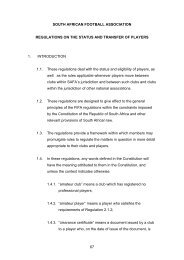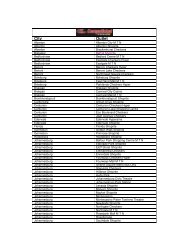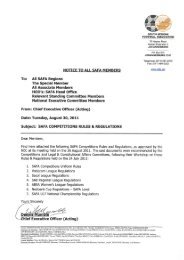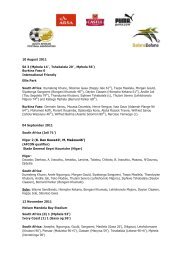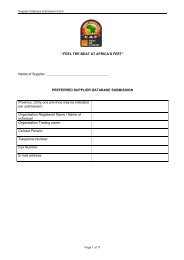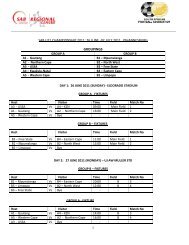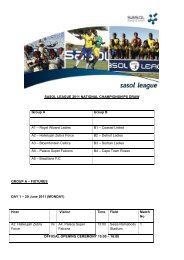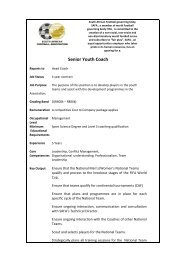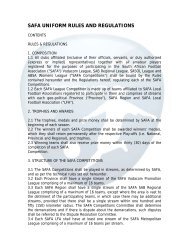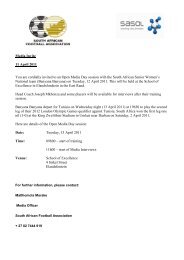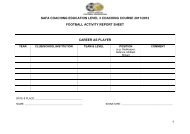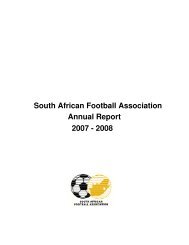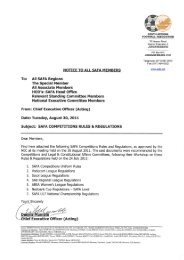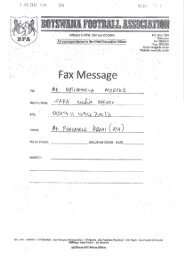FIFA STATUTES
FIFA STATUTES
FIFA STATUTES
- No tags were found...
You also want an ePaper? Increase the reach of your titles
YUMPU automatically turns print PDFs into web optimized ePapers that Google loves.
<strong>FIFA</strong> <strong>STATUTES</strong>Regulations Governing the Applicationof the StatutesStanding Orders of the CongressFédération Internationale de Football Association
Fédération Internationale de Football AssociationPresident:General Secretary:Address:Joseph S. Blatter (Switzerland)Urs Linsi (Switzerland)<strong>FIFA</strong>P.O. Box 7448044 ZurichSwitzerlandTelephone: +41-(0)43-222 7777Telefax: +41-(0)43-222 7878Internet:www.<strong>FIFA</strong>.comwww.<strong>FIFA</strong>worldcup.com73
<strong>FIFA</strong> StatutesRegulations Governing the Applicationof the StatutesStanding Orders of the Congress
INDEXIndex article pageIndex article pageDefinitions 4I. General provisions 1–8 6–8II. Membership 9–18 9–13III. Honorary president and honorary member 19 14IV. Confederations 20 15–17V. Organisation 21–54 18–36A. Congress 22–29 19–23B. Executive Committee 30–31 24–27C. President 32 28D. Emergency Committee 33 29E. Standing committees 34–54 30–36VI. Disciplinary measures 55 37VII. Judicial bodies 56–58 38–39VIII. Arbitration 59–61 40–41IX. Submission to decisions of <strong>FIFA</strong> 62–63 42X. General secretariat 64–65 43XI. Finance 66–70 44–45XII. Rights in competitions and events 71–72 46XIII. Competitions 73–77 47–49A. <strong>FIFA</strong> final competitions 73 47B. International matches and competitions 74–77 48–49XIV. Final provisions 78–80 50Regulations Governing the Application of the StatutesI. Application for admission to <strong>FIFA</strong> 1–2 51II. Definition, notification and registration of matches 3–7 52–54III. Interclub and interleague matches 8 55IV. Tournaments 9 56V. Financial arrangements 10–12 57–58VI. Match and players’ agents 13–14 59VII. Eligibility to play for Association teams 15 60–61VIII. Laws of the Game 16 62IX. Referees and assistant referees 17–19 63–64X. Final provision 20 65Standing Orders of the <strong>FIFA</strong> Congress 1–11 66–72
DEFINITIONSThe terms given below denote the following:1 <strong>FIFA</strong>: “Fédération Internationale de Football Association”.2 Association: a football association recognised by <strong>FIFA</strong>. It is a member of<strong>FIFA</strong>, unless a different meaning is evident from the context.3 League: an organisation that is subordinate to an Association.4 British Associations: the four Associations in the United Kingdom – TheFootball Association, The Scottish Football Association, The FootballAssociation of Wales and The Irish Football Association (NorthernIreland).5 IFAB: the International Football Association Board.6 Confederation: a group of Associations recognised by <strong>FIFA</strong> that belongto the same continent (or assimilable geographic region).7 Congress: the supreme and legislative body of <strong>FIFA</strong>.8 Executive Committee: the executive body of <strong>FIFA</strong>.9 Member: an Association that has been admitted into membership of<strong>FIFA</strong> by the Congress.10 Official: every board member, committee member, referee and assistantreferee, coach, trainer, and other persons responsible for technical, medicaland administrative matters in <strong>FIFA</strong>, a Confederation, Association,League or club.11 Player: any football player licensed by an Association.12 Association Football: the game controlled by <strong>FIFA</strong> and organised in accordancewith the Laws of the Game.NB:Terms referring to natural persons are applicable to both genders. Anyterm in the singular applies to the plural and vice-versa.4 5
I. GENERAL PROVISIONSArticle 1 Name and headquartersArticle 4 Promoting friendly relations1 The Fédération Internationale de Football Association (<strong>FIFA</strong>) is anassociation registered in the Commercial Register in accordancewith art. 60 ff. of the Swiss Civil Code.2 <strong>FIFA</strong> headquarters are located in Zurich (Switzerland) and may onlybe transferred to another location following a resolution passed bythe Congress..1 <strong>FIFA</strong> shall promote friendly relations:(a) between Members, Confederations, clubs, Officials andPlayers. Every person and organisation involved in the gameof football is obliged to observe the Statutes, regulationsand the principles of fair play;(b) in society for humanitarian objectives.Article 2 ObjectivesThe objectives of <strong>FIFA</strong> are:(a) to improve the game of football constantly and promote itglobally in the light of its unifying, educational, culturaland humanitarian values, particularly through youth anddevelopment programmes;(b) to organise its own international competitions;(c) to draw up regulations and provisions and ensuretheir enforcement;(d) to control every type of Association Football by takingappropriate steps to prevent infringements of the Statutes,regulations or decisions of <strong>FIFA</strong> or of the Laws of the Game;(e) to prevent all methods or practices which mightjeopardise the integrity of matches or competitions orgive rise to abuse of Association Football.Article 3 Non-discrimination and stance against racism2 <strong>FIFA</strong> shall provide the necessary institutional means to resolve anydispute that may arise between Members, Confederations, clubs,Officials and Players.Article 5 PlayersThe Executive Committee shall regulate the status of Players and theprovisions for their transfer in special regulations.Article 6 Laws of the Game1 Each Member of <strong>FIFA</strong> shall play Association Football in compliancewith the Laws of the Game issued by IFAB. Only IFAB may lay downand alter the Laws of the Game.2 IFAB is composed of eight members; four members are designatedby <strong>FIFA</strong> and four by the British Associations.3 The duties and responsibilities of IFAB are contained in special regulations.Discrimination of any kind against a country, private person orgroups of people on account of ethnic origin, gender, language, religion,politics or any other reason is strictly prohibited and punishableby suspension or expulsion.6 7
I. GENERAL PROVISIONS II. MEMBERSHIPArticle 7 Conduct of bodies and officialsArticle 9 Admission, suspension and expulsionThe bodies and Officials must observe the Statutes, regulations,decisions and Code of Ethics of <strong>FIFA</strong> in their activities. The ExecutiveCommittee shall draw up the Code of Ethics.Article 8 Official languages1 English, Spanish, French and German are the official languages of<strong>FIFA</strong>. English is the official language for minutes, correspondenceand announcements.2 Members are responsible for translations into the language of theircountry.3 English, Spanish, French, German, Russian, Arabic and Portugueseare the official languages at the Congress. Qualified interpretersshall translate into these languages. Delegates may speak in theirmother tongue if they ensure interpretation into one of the officialCongress languages by a qualified interpreter.4 The Statutes, Regulations Governing the Application of the Statutes,the Standing Orders of the Congress, decisions and announcementsof <strong>FIFA</strong> shall be published in the four official languages. If there isany divergence in the wording, the English text is authoritative.ArticleThe Congress shall decide whether to admit, suspend or expel a Member.10 Admission1 Any Association which is responsible for organising and supervisingfootball in its country may become a Member of <strong>FIFA</strong>. In this context,the expression “country" shall refer to an independent staterecognised by the international community. Subject to par. 5 and par.6 below, only one Association shall be recognised in each country.2 Membership is only permitted if an Association has already been aprovisional member of a Confederation for at least two years.3 Any Association wishing to become a Member of <strong>FIFA</strong> shall apply inwriting to the <strong>FIFA</strong> general secretariat.4 The Association’s legally valid statutes shall be enclosed with theapplication for membership and shall contain the mandatory followingprovisions:(a) always to comply with the Statutes, regulationsand decisions of <strong>FIFA</strong> and of its Confederation;(b) to comply with the Laws of the Game in force;(c) to recognise the Court of Arbitration for Sport,as specified in these Statutes.5 Each of the four British Associations is recognised as a separateMember of <strong>FIFA</strong>.6 An Association in a region which has not yet gained independencemay, with the authorisation of the Association in the country onwhich it is dependent, also apply for admission to <strong>FIFA</strong>.7 The Regulations Governing the Application of the Statutes shall regulatethe details of the procedure for admission.8 This article shall not affect the status of existing Members.8 9
II. MEMBERSHIPArticle11 Request and procedure for applicationArticle13 Members’ obligations1 The Executive Committee shall request the Congress either to admitor not to admit an Association. The Association may state the reasonsfor its application to the Congress.1 Members have the following obligations:(a) to comply fully with the Statutes, regulations, directivesand decisions of <strong>FIFA</strong> bodies at any time;(b) to take part in competitions organised by <strong>FIFA</strong>;(c) to pay their membership subscriptions;(d) to ensure that their own members comply with the Statutes,regulations, directives and decisions of <strong>FIFA</strong> bodies;(e) to respect the Laws of the Game;(f) to comply fully with all other duties arisingfrom these Statutes and other regulations.2 The new Member shall acquire membership rights and duties assoon as it has been admitted. Its delegates are eligible to vote andbe elected with immediate effect.Article12 Members’ rights1 Members have the following rights:(a) to take part in the Congress;(b) to draw up proposals for inclusion inthe agenda of the Congress;2 Violation of the above-mentioned obligations by any Member maylead to sanctions provided for in these Statutes.(c) to nominate candidates for the <strong>FIFA</strong> presidency;Article14 Suspension(d) to take part in competitions organised by <strong>FIFA</strong>;(e) to take part in <strong>FIFA</strong>’s assistance anddevelopment programmes;(f) to exercise all other rights arising fromthese Statutes and other regulations.1 The Congress is responsible for suspending a Member. The ExecutiveCommittee may, however, suspend a Member that seriously andrepeatedly violates its obligations as a Member with immediateeffect. The suspension shall last until the next Congress, unless theExecutive Committee has lifted it in the meantime.2 The exercise of these rights is subject to other provisions in theseStatutes and the applicable regulations.2 A suspension shall be confirmed at the next Congress by a threequartermajority of the votes taken. If it is not confirmed, the suspensionis automatically lifted.3 A suspended Member shall lose its membership rights. OtherMembers may not entertain sporting contact with a suspendedMember. The Disciplinary Committee may impose further sanctions.4 Members which do not participate in at least two of all <strong>FIFA</strong> competitionsover a period of four consecutive years shall be suspendedfrom voting at the Congress until they have fulfilled their obligationsin this respect.10 11
II. MEMBERSHIPArticle15 ExpulsionArticle17 Bodies1 The Congress may expel a Member:(a) if it fails to fulfil its financial obligations towards <strong>FIFA</strong>; or(b) if it seriously violates the Statutes, regulations,decisions or the Code of Ethics of <strong>FIFA</strong>; or(c) if it loses the status of an Association representingAssociation Football in its country.1 A Member’s bodies shall be either elected or appointed in thatAssociation. A Member’s statutes shall provide for a procedure thatguarantees the complete independence of the election or appointment.2 Any Member’s bodies that have not been elected or appointed incompliance with the provisions of par. 1, even on an interim basis,shall not be recognised by <strong>FIFA</strong>.2 The presence of an absolute majority of Members entitled to vote atthe Congress is necessary for an expulsion to be valid, and themotion for expulsion must be adopted by a three-quarter majorityof the votes taken.3 Decisions passed by bodies that have not been elected or appointedin compliance with par. 1 shall not be recognised by <strong>FIFA</strong>.Article18 Status of Leagues and other groups of clubsArticle16 Resignation1 A Member may resign from <strong>FIFA</strong> with effect from the end of a calendaryear. Notice of resignation must reach the general secretariatno later than six months before the end of the calendar year andbe sent by registered letter.1 Leagues or any other groups affiliated to a Member of <strong>FIFA</strong> shall besubordinate to and recognised by that Member. The Member’sstatutes shall define the scope of authority and the rights and dutiesof these groups. The statutes and regulations of these groups shallbe approved by the Member.2 The resignation is not valid until the Member wishing to resign hasfulfilled its financial obligations towards <strong>FIFA</strong> and its other Members.2 Every Member shall ensure that its affiliated clubs can take all decisionson any matters regarding membership independently of anyexternal body. This obligation applies regardless of an affiliatedclub's corporate structure. In any case, the Member shall ensurethat neither a natural nor a legal person (including holding companiesand subsidiaries) exercises control over more than one clubwhenever the integrity of any match or competition could be jeopardised.12 13
III. HONORARY PRESIDENT AND HONORARY MEMBERIV. CONFEDERATIONSArticle19 Honorary president and honorary memberArticle20 Confederations1 The Congress may bestow the title of honorary president or honorarymember upon any persons for meritorious service to football.1 Members that belong to the same continent have formed the followingConfederations, which are recognised by <strong>FIFA</strong>:2 The Executive Committee shall make these nominations.3 The honorary president or honorary member may take part in theCongress. They may join in the debates but may not vote.(a) Confederación Sudamericana de Fútbol – CONMEBOL(b) Asian Football Confederation – AFC(c) Union des associations européennes de football – UEFA(d) Confédération Africaine de Football – CAF(e) Confederation of North, Central American and CaribbeanAssociation Football – CONCACAF(f) Oceania Football Confederation – OFC2 <strong>FIFA</strong> may, in exceptional circumstances, authorise a Confederationto grant membership to an Association that belongs geographicallyto another continent and is not affiliated to the Confederationon that continent. The opinion of the Confederation concerned geographicallyshall be obtained.3 Each Confederation shall have the following rights and obligations:(a) to comply with and enforce compliance with the Statutes,regulations and decisions of <strong>FIFA</strong>;(b) to work closely with <strong>FIFA</strong> in every domain so as to achieve theobjectives stipulated in art. 2 and to organise international competitions;(c) to organise its own interclub competitions, in compliance withthe international match calendar;(d) to organise its own international competitions, particularlyyouth competitions, in compliance with the international matchcalendar;(e) to ensure that international Leagues or any other such groupsof clubs or Leagues shall not be formed without its consent andthe approval of <strong>FIFA</strong>;14 15
IV. CONFEDERATIONS(f) at the request of <strong>FIFA</strong>, to grant Associations applying for membershipthe status of a provisional member. This status shallgrant Associations the right to take part in the Confederation’scompetitions and conferences.Any other rights and obligations of the provisional member shallbe regulated by the Confederation’s statutes and regulations.Provisional members may not take part in <strong>FIFA</strong> final competitions;4 The Executive Committee may delegate other duties or powers tothe Confederations. To this end, <strong>FIFA</strong> may conclude an appropriateagreement with each of the Confederations concerned.5 The Confederations’ statutes and regulations shall be submitted to<strong>FIFA</strong> for approval.(g) to appoint to the Executive Committee members to which theyare entitled in compliance with these Statutes;(h) to nurture relations and cooperation with <strong>FIFA</strong> actively and constructivelyfor the Good of the Game through consultative meetingsand to discuss and resolve any problems relating to theinterests of the Confederations and <strong>FIFA</strong>;(i) to ensure that the representatives appointed to <strong>FIFA</strong> bodiesor the Executive Committee carry out their activities on thesebodies with mutual respect, solidarity, recognition and fair play;(j) to set up committees that work closely together with the correspondingcommittees at <strong>FIFA</strong>;(k) exceptionally to allow, with <strong>FIFA</strong>’s consent, an Association fromanother Confederation (or clubs belonging to that Association)to participate in a competition that it is organising;(l) with the mutual cooperation of <strong>FIFA</strong>, to take any action considerednecessary to develop the game of football on the continentconcerned, such as arranging development programmes,courses, conferences etc.;(m) to set up the bodies necessary to fulfil the duties incumbentupon it;(n) to procure the funds necessary to fulfil its duties.16 17
V. ORGANISATIONV. ORGANISATIONA. CONGRESSArticle21 BodiesArticle22 Congress1 The Congress is the supreme and legislative body.1 A Congress may be an Ordinary or an Extraordinary Congress.2 The Executive Committee is the executive body.3 The general secretariat is the administrative body.4 Standing and ad-hoc committees shall advise and assist the ExecutiveCommittee in fulfilling its duties. Their primary duties aredefined in these Statutes and their composition, function and additionalduties are defined in special regulations.2 The Ordinary Congress shall be held every year. The Executive Committeeshall fix the place and date. The Members shall be notifiedin writing at least three months in advance. The formal convocationshall be made in writing at least one month before the date of theCongress. This convocation shall contain the agenda, the President’sreport, the financial statements and the auditors’ report.3 The Executive Committee may convene an Extraordinary Congressat any time.4 The Executive Committee shall convene an Extraordinary Congressif one-fifth of the Members make such a request in writing. Therequest shall specify the items for the agenda. An ExtraordinaryCongress shall be held within three months of receipt of the request.5 The Members shall be notified of the place, date and agenda at leasttwo months before the date of an Extraordinary Congress. The agendaof an Extraordinary Congress may not be altered.Article23 Vote, delegates, observers1 Each Member has one vote in the Congress and is represented byits delegates. Only the Members present are entitled to vote. Votingby proxy or by letter is not permitted.2 Delegates must belong to the Member Association that they representand be appointed by the appropriate body of that Association.3 Confederation delegates may take part in the Congress as observers.4 During their term of office, members of the Executive Committeemay not be appointed as delegates for their Association.5 The President shall conduct the Congress business in compliancewith the Standing Orders of the Congress.18 19
V. ORGANISATIONA. CONGRESSArticleArticle24 Candidates for the office of <strong>FIFA</strong> President1 Only Members may propose candidates for the office of president.Members shall notify the <strong>FIFA</strong> general secretariat in writing of thename of a candidate for the <strong>FIFA</strong> presidency at least two monthsbefore the date of the Congress.2 The general secretariat shall notify the Members of the names ofproposed candidates at least one month before the date of theCongress.25 Ordinary Congress Agenda1 The General Secretary shall draw up the agenda based on proposalsfrom the Executive Committee and the Members. Any proposalthat a Member wishes to submit to the Congress shall be sent to thegeneral secretariat in writing, with a brief explanation, at least twomonths before the date of the Congress.2 The Congress agenda shall include the following mandatory items:(a) a declaration that the Congress has been convened and composedin compliance with the Statutes;(b) approval of the agenda;(c) an address by the President(d) appointment of five Members to check the minutes;(e) appointment of scrutineers;(f) suspension or expulsion of a Member (if applicable);(g) approval of the minutes of the preceding Congress;(h) activity report (containing the activities since the last Congress);(i) presentation of the consolidated and revised Balance Sheet andthe Profit and Loss Statement;(j) approval of the financial statements;(k) approval of the budget;(l) admission for membership (if applicable);(m)votes on proposals for amendments to the Statutes, the RegulationsGoverning the Application of the Statutesand the StandingOrders of the Congress (if applicable);(n) discussion of proposals submitted by the Members and theExecutive Committee within the period stipulated under par. 1(if applicable);(o) appointment of auditors (if applicable);(p) election of the President and installation of the vice-presidentsand Members of the Executive Committee (if applicable).3 The agenda of an Ordinary Congress may be altered, provided threequartersof the Members present at the Congress and eligible tovote agree to such a motion.20 21
V. ORGANISATIONA. CONGRESSArticle26 Amendments to the Statutes, Regulations Governing the Applicationof the Statutes and the Standing Orders of the CongressArticle27 Elections, other decisions, requisite majority1 The Congress is responsible for amending the Statutes, the RegulationsGoverning the Application of the Statutes and the StandingOrders of the Congress.2 Any proposals for an amendment to the Statutes must be submittedin writing with a brief explanation to the general secretariat bya Member or by the Executive Committee. A proposal submitted bya Member is valid, provided it has been supported in writing by atleast two other Members.3 For a vote on an amendment to the Statutes to be valid, an absolutemajority (half of the Members plus one Member) of the Members eligibleto vote must be present.1 Elections shall be conducted by secret ballot.2 Any other decision that requires a vote shall be reached by a showof hands or by means of an electronic count. If a show of hands doesnot result in a clear majority in favour of a motion, the vote shall betaken by calling the roll, members being called in English alphabeticalorder.3 For the election of the President, two-thirds of the votes recordedand valid are necessary in the first ballot. In the second and anyother requisite ballot, an absolute majority of the votes recorded issufficient. If there are more than two candidates, whoever obtainsthe lowest number of votes is eliminated as from the second ballotuntil only two candidates are left.4 A proposal for an amendment to the Statutes shall be adopted only ifthree-quarters of the Members present and eligible to vote agree to it.5 Any proposal to amend the Regulations Governing the Applicationof the Statutes and the Standing Orders of the Congress must besubmitted in writing with a brief explanation to the general secretariatby a Member or by the Executive Committee.Article4 Unless otherwise stipulated in the Statutes, a simple majority issufficient for a vote to be valid. The number of valid votes countedshall decide the simple majority. Abstentions are disregarded incalculating the majority.28 Minutes6 A proposal for an amendment to the Regulations Governing theApplication of the Statutes and the Standing Orders of the Congressshall be adopted only if a simple majority of the Members presentand eligible to vote agree to it.1 The General Secretary shall be responsible for recording the minutesat the Congress.2 The minutes of the Congress shall be checked by those Membersdesignated.Article29 Effective dates of decisionsDecisions passed by the Congress shall come into effect for theMembers sixty days after the close of the Congress, unless theCongress fixes another date for a decision to take effect.22 23
V. ORGANISATIONB. EXECUTIVE COMMITTEEArticle30 Composition, election of President, vice-presidents and members1 The Executive Committee consists of 24 members:1 President, elected by the Congress8 vice-presidents, and15 members, appointed by the Confederations and Associations.2 The President shall be elected by the Congress for a period of fouryears in the year following a <strong>FIFA</strong> World Cup. His mandate shall beginafter the end of the Congress which has elected him. A Presidentmay be re-elected.3 The members of the Executive Committee shall be appointed bythe respective Confederations, with the exception of the vice-presidentrepresenting the four British Associations, who is elected by thelatter. All Confederations and the four British Associations shallpass a single decision as to when they wish to appoint or elect theirmember(s) to the <strong>FIFA</strong> Executive Committee. The subsequentCongresses of the Confederations and the four British Associationsshall take this decision within one year of these Statutes cominginto force. When making the appointments, a Confederation mayappoint or reappoint only half of its members (in the case of oddnumbers, half of the appointments plus or minus one), and onlyevery two years. The Executive Committee members’ mandates shalllast for four years, starting upon their installation by the <strong>FIFA</strong>Congress. If a Confederation or the four British Associations decideto change the year for making appointments or holding an electionin its statutes, the mandate of the vice-president and membersappointed to the <strong>FIFA</strong> Executive Committee will be extended by oneyear, but only once.An installed member of the Executive Committee may only beremoved from office by the <strong>FIFA</strong> Congress.The Confederations are apportioned the following places:(a) CONMEBOL vice-president (1) members (2)(b) AFC vice-president (1) members (3)(c) UEFA vice-presidents (2) members (5)(d) CAF vice-president (1) members (3)(e) CONCACAF vice-president (1) members (2)(f) OFC vice-president (1) member (–)(g) the four BritishAssociations vice-president (1) member (–)4 Not more than one member from the same Association may serveon the Executive Committee simultaneously.5 The mandate of vice-presidents and members is for four years. Theymay be re-elected.6 If the President is permanently or temporarily prevented from performinghis official function, the longest serving vice-president shallrepresent him until the next Congress. This Congress shall elect anew President, if necessary.7 Any member of the Executive Committee who no longer exerciseshis official function shall be immediately replaced by the Confederationor Associations which appointed him for the remainingperiod of office.2425
V. ORGANISATIONB. EXECUTIVE COMMITTEEArticle31 Powers of the Executive Committee1 The Executive Committee shall pass decisions on all cases that donot come within the sphere of responsibility of the Congress or arenot reserved for other bodies by law or under these Statutes.2 The Executive Committee shall meet at least twice a year.3 The President shall convene the Executive Committee meetings. Ifthirteen members of the Executive Committee request a meeting,the President shall convene it.4 The Executive Committee shall appoint the chairmen, deputy chairmenand members of the standing committees.5 The Executive Committee shall appoint the chairmen, deputy chairmenand members of the judicial bodies.6 The President shall compile the agenda. Each member of the ExecutiveCommittee is entitled to propose items for inclusion in theagenda.7 The Executive Committee may decide to set up ad-hoc committeesif necessary at any time.8 The Executive Committee shall appoint the delegates from <strong>FIFA</strong> toIFAB.9 The Executive Committee shall compile the regulations for theorganisation of standing committees and ad-hoc committees.10 The Executive Committee shall appoint or dismiss the GeneralSecretary on the proposal of the President.The General Secretary shall attend the meetings of all the committeesex officio.11 The Executive Committee shall decide the place and dates of thefinal competitions of <strong>FIFA</strong> tournaments and the number of teamstaking part from each Confederation.12 The Executive Committee shall approve regulations stipulating how<strong>FIFA</strong> shall be organised internally.2627
V. ORGANISATIONC. PRESIDENTV. ORGANISATIOND. EMERGENCY COMMITTEEArticle32 PresidentArticle33 Emergency Committee1 The President represents <strong>FIFA</strong> legally.2 He is primarily responsible for :(a) implementing the decisions passed by the Congress andthe Executive Committee through the general secretariat;(b) supervising the work of the general secretariat;(c) relations between <strong>FIFA</strong> and the Confederations, Members,political bodies and international organisations;3 Only the President may propose the appointment or dismissal of theGeneral Secretary.1 The Emergency Committee shall deal with all matters requiringimmediate settlement between two meetings of the ExecutiveCommittee. The committee shall consist of the <strong>FIFA</strong> President andone member from each Confederation appointed by the ExecutiveCommittee and chosen from among its members for a period offour years.2 The President shall convene the Emergency Committee meetings. Ifa meeting cannot be convened within an appropriate period of time,decisions may be passed through other means of communication.Such decisions shall have immediate legal effect. The Presidentshall notify the Executive Committee immediately of the decisionspassed by the Emergency Committee.4 The President shall preside over the Congress, the Executive andEmergency Committee meetings and those committees of which hehas been appointed chairman.3 All decisions taken by the Emergency Committee shall be ratified bythe Executive Committee at its next meeting.5 The President shall have an ordinary vote on the Executive Committeeand, whenever votes are equal, shall have a casting vote.4 If the President is unable to attend a meeting, the longest servingvice-president available shall deputise.6 If the President is absent or unavailable, the longest serving vicepresidentavailable shall deputise.7 Any additional powers of the President shall be contained in theinternal organisation regulations of <strong>FIFA</strong>.5 The President is entitled to designate a deputy for any member whois unable to attend or has a conflict of interests. The deputy shallbelong to the Executive Committee and the same Confederation asthe member who is unable to attend or has a conflict of interests.2829
V. ORGANISATIONE. STANDING COMMITTEESArticle34 Standing committees1 The standing committees are:(a) Finance Committee(b) Internal Audit Committee(c) Organising Committee for the <strong>FIFA</strong> World Cup(d) Organising Committee for the <strong>FIFA</strong> Confederations Cup(e) Organising Committee for theOlympic Football Tournaments(f) Organising Committee for the <strong>FIFA</strong> World YouthChampionships(g) Committee for Women’s Football and<strong>FIFA</strong> Women’s Competitions(h) Futsal Committee(i) Organising Committee for the<strong>FIFA</strong> Club World Championship(j) Referees Committee(k) Technical and Development Committee(l) Sports Medical Committee(m) Players’ Status Committee(n) Legal Committee(o) Committee for Ethics and Fair Play(p) Media Committee(q) Associations Committee(r) Football Committee(s) Strategic Studies Committee(t) Marketing and Television Advisory Board2 The chairmen and deputy chairmen of the standing committeesshall be members of the Executive Committee with the exception ofthose for the Internal Audit Committee, who may not belong to theExecutive Committee.3 The members of each standing committee shall be designated by theExecutive Committee on the proposal of the Members of <strong>FIFA</strong>, thePresident of <strong>FIFA</strong> or the Confederations.The chairmen, deputy chairmen and the members of the standingcommittees shall be designated for a term of office of four years.4 The composition, specific duties and powers of the individual committeesshall be stipulated in special organisation regulations.5 Each chairman shall represent his committee and conduct businessin compliance with the relevant organisation regulations.6 Each committee may, if necessary, set up a bureau and/or sub-committeeto settle urgent matters.7 Each committee may propose amendments to its regulations to theExecutive Committee.3031
V. ORGANISATIONE. STANDING COMMITTEESArticle35 Finance CommitteeArticle39 Organising Committee for the Olympic Football TournamentsThe Finance Committee shall monitor the financial managementand advise the Executive Committee on financial matters and assetmanagement. It shall analyse the <strong>FIFA</strong> budget and the financialstatements prepared by the General Secretary and submit them tothe Executive Committee for approval.The Organising Committee for the Olympic Football Tournamentsshall organise the Olympic Football Tournaments in compliancewith the provisions of the regulations applicable to these tournamentsand the Olympic Charter.Article36 Internal Audit CommitteeArticle40 Organising Committee for the <strong>FIFA</strong> World Youth ChampionshipsThe Internal Audit Committee shall ensure the completeness andreliability of the financial accounting and review the external auditors’report at the request of the Executive Committee.The Organising Committee for the <strong>FIFA</strong> World Youth Championshipsshall organise the <strong>FIFA</strong> World Youth Championship and the <strong>FIFA</strong>U-17 World Championship in compliance with the special regulationsfor each competition, the Lists of Requirements and the OrganisingAssociation Agreements.ArticleArticle37 Organising Committee for the <strong>FIFA</strong> World CupThe Organising Committee for the <strong>FIFA</strong> World Cup shall organisethe <strong>FIFA</strong> World Cup in compliance with the provisions of the regulationsapplicable to this competition, the List of Requirements andthe Organising Association Agreement.38 Organising Committee for the <strong>FIFA</strong> Confederations CupThe Organising Committee for the <strong>FIFA</strong> Confederations Cup shallorganise the <strong>FIFA</strong> Confederations Cup in compliance with the provisionsof the regulations applicable to this competition, the List ofRequirements and the Organising Association Agreement.ArticleArticle41 Committee for Women’s Football and<strong>FIFA</strong> Women’s CompetitionsThe Committee for Women’s Football and <strong>FIFA</strong> Women’s Competitionsshall organise the <strong>FIFA</strong> Women’s World Cup and the <strong>FIFA</strong>U-19 Women’s World Championship in compliance with the regulationsfor these competitions, the Lists of Requirements and theOrganising Association Agreements and deal with general issuesrelating to women’s football.42 Futsal CommitteeThe Futsal Committee shall organise the <strong>FIFA</strong> Futsal World Championshipin compliance with the regulations for the competition,the List of Requirements and the Organising Association Agreementand draw up the Futsal Laws of the Game and deal with generalissues relating to futsal.3233
V. ORGANISATIONE. STANDING COMMITTEESArticle43 Organising Committee for the <strong>FIFA</strong> Club World ChampionshipArticle47 Players’ Status CommitteeThe Organising Committee for the <strong>FIFA</strong> Club World Championshipshall organise the <strong>FIFA</strong> Club World Championship in compliancewith the provisions of the regulations applicable to this competition,the List of Requirements and the Organising Association Agreement.1 The Players’ Status Committee shall set up and monitor compliancewith the Regulations for the Status and Transfer of Players and determinethe status of Players for various <strong>FIFA</strong> competitions. Its powersof jurisdiction are governed by the Regulations for the Status andTransfer of Players.Article44 Referees CommitteeThe Referees Committee shall implement and interpret the Laws ofthe Game and may propose amendments to the Laws of the Gameto the Executive Committee. It shall appoint the referees and assistantreferees for matches in competitions organised by <strong>FIFA</strong>.Article2 It shall also be responsible for the work of the Dispute ResolutionChamber in accordance with the Regulations for the Status andTransfer of Players and the Rules Governing the Practice and Proceduresof this Chamber.48 Legal CommitteeArticle45 Technical and Development CommitteeThe Technical and Development Committee shall primarily analysethe basic aspects of football training and technical development.The Legal Committee shall analyse basic legal issues relating tofootball and the evolution of the Statutes and regulations of <strong>FIFA</strong>,the Confederations and Members.Article49 Committee for Ethics and Fair PlayArticle46 Sports Medical CommitteeThe Sports Medical Committee shall deal with all medical aspectsof football.The Committee for Ethics and Fair Play shall deal with everythingrelating to ethics in football and the promotion of fair play.Article50 Media CommitteeThe Media Committee shall deal with the working conditions forthe media at <strong>FIFA</strong> events and maintain relations with internationalmedia organisations.34 35
V. ORGANISATIONE. STANDING COMMITTEESVI. DISCIPLINARY MEASURESArticle51 Associations CommitteeArticle55 Disciplinary measuresArticleThe Associations Committee shall deal with relations between <strong>FIFA</strong>and its Members and draw up proposals for optimum cooperation.The committee shall also monitor the evolution of the Statutes andregulations of <strong>FIFA</strong>, the Confederations and Members.52 Football CommitteeThe disciplinary measures are primarily:1 for natural and legal persons:(a) a warning;(b) a reprimand;(c) a fine;(d) the return of awards.ArticleThe Football Committee shall deal with general issues in footballbut primarily with its structure as well as relations between clubs,Leagues, Members, Confederations and <strong>FIFA</strong>.53 Strategic Studies Committee2 for natural persons:(a) a caution;(b) an expulsion;(c) a match suspension;(d) a ban from the dressing rooms and/or the substitutes’ bench;(e) a ban from entering a stadium;(f) a ban on taking part in any football-related activity.ArticleThe Strategic Studies Committee shall deal with global strategiesfor football and its political, economic and social status.54 Marketing and Television Advisory BoardThe Marketing and Television Advisory Board shall advise theExecutive Committee with regard to drafting and implementingcontracts between <strong>FIFA</strong> and its various marketing/television partnersand analyse marketing and television strategies that have beendevised.3 for legal persons:(a) a transfer ban;(b) playing a match without spectators;(c) playing a match on neutral territory;(d) a ban on playing in a particular stadium;(e) annulment of the result of a match;(f) expulsion;(g) a forfeit;(h) deduction of points;(i) relegation to a lower division.4 The Executive Committee shall draw up a <strong>FIFA</strong> Disciplinary Code.36 37
VII. JUDICIAL BODIESArticle56 Judicial bodiesArticle58 Appeal Committee1 The judicial bodies of <strong>FIFA</strong> are:(a) the Disciplinary Committee;(b) the Appeal Committee.2 The responsibilities and function of these bodies shall be stipulatedin the <strong>FIFA</strong> Disciplinary Code.1 The Appeal Committee shall consist of a chairman, deputy chairmanand the number of members deemed necessary. The chairman anddeputy chairman shall have legal qualifications.2 The function of this body shall be governed by the <strong>FIFA</strong> DisciplinaryCode. The committee shall pass decisions only when at least threemembers are present. In certain cases, the chairman may rule alone.Article3 The decision-making powers of certain committees remain unaffected.57 Disciplinary Committee3 The Appeal Committee is responsible for hearing appeals againstdecisions from the Disciplinary Committee that are not declaredfinal by the relevant <strong>FIFA</strong> regulations as well as decisions passed bythe Players’ Status Committee concerning the eligibility of Playersfor Association teams.1 The Disciplinary Committee shall consist of a chairman, deputychairman and the number of members deemed necessary. The chairmanand the deputy chairman shall have legal qualifications.4 Decisions pronounced by the Appeal Committee shall be irrevocableand binding on all the parties concerned. This provision is subjectto appeals lodged with the Court of Arbitration for Sport (CAS).2 The function of this body shall be governed by the <strong>FIFA</strong> DisciplinaryCode. The committee shall pass decisions only when at least threemembers are present. In certain cases, the chairman may rule alone.3 The committee may pronounce the sanctions described in theseStatutes and the <strong>FIFA</strong> Disciplinary Code on Members, clubs, Officials,Players and match and players’ agents.4 These provisions are subject to the disciplinary powers of the Congressand Executive Committee with regard to the suspension andexpulsion of Members.38 39
VIII. ARBITRATIONArticle59 Court of Arbitration for Sport (CAS)Article 61 ObligationArticle1 <strong>FIFA</strong> recognises the independent Court of Arbitration for Sport (CAS)with headquarters in Lausanne (Switzerland) to resolve disputesbetween <strong>FIFA</strong>, Members, Confederations, Leagues, clubs, Players,Officials and licensed match agents and players’ agents.2 The provisions of the CAS Code of Sports-Related Arbitration shallapply to the proceedings. CAS shall primarily apply the various regulationsof <strong>FIFA</strong> and, additionally, Swiss law.60 Jurisdiction of CAS1 Appeals against final decisions passed by <strong>FIFA</strong>’s legal bodies andagainst decisions passed by Confederations, Members or Leaguesshall be lodged with CAS within 21 days of notification of the decisionin question.2 Recourse may only be made to CAS after all other internal channelshave been exhausted.3 CAS, however, does not deal with appeals arising from:(a) violations of the Laws of the Game;(b) suspensions of up to four matches or up to three months;(c) decisions against which an appeal to an independent and dulyconstituted arbitration tribunal recognised under the rules ofan Association or Confederation may be made.4 The appeal shall not have a suspensive effect. The appropriate <strong>FIFA</strong>body or, alternatively, CAS may order the appeal to have a suspensiveeffect.5 The World Anti-Doping Agency (WADA), is entitled to appeal to CASonly in cases of doping decisions after every internal channel hasbeen exhausted at <strong>FIFA</strong>, Confederation or Association level.1 The Confederations, Members and Leagues shall agree to recogniseCAS as an independent judicial authority and to ensure thattheir members, affiliated Players and Officials comply with the decisionspassed by CAS. The same obligation shall apply to licensedmatch and players’ agents.2 Recourse to ordinary courts of law is prohibited unless specificallyprovided for in the <strong>FIFA</strong> regulations.3 To ensure the foregoing, the Associations shall insert a clause intheir statutes stipulating that their clubs and members are prohibitedfrom taking a dispute to ordinary courts of law and are requiredto submit any disagreement to the jurisdiction of the Association,the appropriate Confederation or <strong>FIFA</strong>.4041
IX. SUBMISSION TO DECISIONS OF <strong>FIFA</strong>X. GENERAL SECRETARIATArticle62 PrincipleArticle64 General secretariat1 The Confederations, Members and Leagues shall agree to complyfully with any decisions passed by the relevant <strong>FIFA</strong> bodies which,according to these Statutes, are final and not subject to appeal.The general secretariat shall carry out all the administrative work of<strong>FIFA</strong> under the direction of the General Secretary.2 They shall take every precaution necessary to ensure that their ownmembers, Players and Officials comply with these decisions.Article65 General Secretary3 The same obligation applies to licensed match and players’ agents.1 The General Secretary is the chief executive of the general secretariat.Article63 Sanctions2 He shall be appointed on the basis of an agreement governed by privatelaw.Any violation of the foregoing provisions will be punished in compliancewith the <strong>FIFA</strong> Disciplinary Code.3 He shall be responsible for:(a) implementing decisions passed by the Congress andExecutive Committee in compliance with the President’sdirectives;(b) managing and keeping the accounts of <strong>FIFA</strong> properly;(c) compiling the minutes for the meetings of the Congress,Executive Committee, Emergency Committee and standingand ad-hoc committees;(d) <strong>FIFA</strong>’s correspondence;(e) relations with the Confederations, Members and committees;(f) organising the general secretariat;(g) the appointment and dismissal of staff workingin the general secretariat.(h) signing decisions on behalf of any <strong>FIFA</strong> committee, providedthat no other ruling exists in the respective regulations.4 The President shall appoint the managerial staff (directors) in thegeneral secretariat on the proposal of the General Secretary.42 43
XI. FINANCEArticle66 Financial periodArticle69 SettlementArticle1 The financial period of <strong>FIFA</strong> shall be four years and shall begin oneach 1 January in the year following the final competition of the<strong>FIFA</strong> World Cup.2 The revenue and expenditure of <strong>FIFA</strong> shall be managed so that theybalance out over the financial period. <strong>FIFA</strong>’s major duties in thefuture shall be guaranteed through the creation of reserves.3 The General Secretary is responsible for drawing up the annual consolidatedaccounts of <strong>FIFA</strong> with its subsidiaries as at 31 December.67 AuditorsArticle<strong>FIFA</strong> may debit any Member’s account to settle claims.70 Levies1 Members shall pay <strong>FIFA</strong> a levy for every international match playedbetween two “A” Association teams. Matches played as part of theOlympic Football Tournaments shall be regarded as internationalmatches. The levy shall be calculated in compliance with the provisionsin the Regulations Governing the Application of the Statuteson the basis of the gross revenue and shall be payable by theMember in whose country the match is being played.The auditors shall audit the accounts approved by the FinanceCommittee and present a report to the Congress. The auditors shallbe appointed for a period of four years. This mandate may berenewed.2 The Confederations may demand their own levy independently of<strong>FIFA</strong>, in accordance with the Confederations’ statutes and regulations.Article68 Membership subscriptions1 Membership subscriptions are due on 1 January of each year. Theannual subscription for new Members for the year in question shallbe paid within 30 days of the close of the Congress at which theywere admitted.2 The Congress shall fix the amount of the annual subscription everyfour years on the recommendation of the Executive Committee. Itshall be the same for every Member and amount to no more thanUSD 1,000.44 45
XIII. COMPETITIONSXII. RIGHTS IN COMPETITIONS AND EVENTSA. <strong>FIFA</strong> FINAL COMPETITIONSArticle71 RightsArticle73 Venue1 <strong>FIFA</strong>, its Members and the Confederations are the original ownersof all of the rights emanating from competitions and other eventscoming under their respective jurisdiction, without any restrictionsas to content, time, place and law. These rights include, among others,every kind of financial rights, audiovisual and radio recording,reproduction and broadcasting rights, multimedia rights, marketingand promotional rights and incorporeal rights such as emblemsand rights arising under copyright law.1 The Executive Committee shall decide the venue for the final competitionsorganised by <strong>FIFA</strong>. As a rule, tournaments may not be heldon the same continent on two successive occasions. The ExecutiveCommittee shall issue guidelines in this connection.2 The <strong>FIFA</strong> World Cup Regulations shall stipulate that a certainamount of the gross revenue shall be utilised for development purposes.2 The Executive Committee shall decide how and to what extent theserights are utilised and draw up special regulations to this end. TheExecutive Committee shall alone decide whether these rights shallbe utilised exclusively, or jointly with a third party or entirely througha third party.Article 72 Authorisation1 <strong>FIFA</strong>, its Members and the Confederations are exclusively responsiblefor authorising the distribution of image and sound and otherdata carriers of football matches and events coming under theirrespective jurisdiction, without any restrictions as to content, time,place and technical and legal aspects.2 The Executive Committee shall issue special regulations to this end.46 47
XIII. COMPETITIONSB. INTERNATIONAL MATCHES AND COMPETITIONSArticle74 International match calendarArticle77 ApprovalArticleThe Executive Committee shall compile an international match calendarthat shall be binding upon the Confederations, Members andLeagues, after conferring with the Confederations.75 International matches and competitionsAny Association, League or club that is affiliated to a Member cannotbelong to another Member or participate in competitions onthe territory of another Member without the authorisation of its currentand prospective Members and of <strong>FIFA</strong>, except in exceptionalcircumstances.1 The Executive Committee shall be responsible for issuing provisionsfor organising international matches and competitions betweenAssociation teams and between League and/or club teams.No such match or competition shall take place without the priorpermission of <strong>FIFA</strong>.2 The Executive Committee may draw up further technical provisions.Article76 Contacts1 Matches may not be played or sporting contacts made betweenmembers and Associations that are not Members of <strong>FIFA</strong> or provisionalmembers of the confederations, or their clubs, without theapproval of <strong>FIFA</strong>.2 Matches against teams whose players do not belong to a club or aLeague affiliated to a <strong>FIFA</strong> Member are prohibited.3 Members and their clubs may not play on the territory of anotherMember without the latter’s approval.48 49
XIV. FINAL PROVISIONSI. APPLICATION FOR ADMISSION TO <strong>FIFA</strong>ArticleArticleArticle78 Unforeseen contingencies and force majeureThe Executive Committee shall have the final decision on any mattersnot provided for in these Statutes or in cases of force majeure.79 DissolutionIf <strong>FIFA</strong> is disbanded, its assets shall be transferred to the supremecourt of the country in which its headquarters are situated. It shallhold these assets in trust as “bonus pater familiae” until <strong>FIFA</strong> is reestablished.80 EnforcementThese Statutes were adopted at the Extraordinary Congress in Dohaon 19 October 2003 and will come into force on 1 January 2004.Art. 30 par. 3, art. 34 par. 1(j), art. 44, art. 59, art. 60 and art. 65 par. 3were supplemented or amended by the Ordinary Congress inMarrakech on 12 September 2005. These amendments come intoforce on 1 December 2005.Regulations Governingthe Application of the StatutesArticle 1 Application for admission1 <strong>FIFA</strong> shall verify that each application for admission is completeand shall forward it to the appropriate Confederation.2 A Confederation that grants provisional membership to an Associationrequesting admission to <strong>FIFA</strong> in compliance with the Statutesshall observe the manner in which the applicant Association isorganised over a period of at least two years.3 The Confederation shall compile a final detailed report for <strong>FIFA</strong>describing how the Association is organised.4 The Executive Committee shall lay down the procedure for admissionin special regulations.Article 2 ConfederationsDoha, 19 October 2003 / Marrakech, 12 September 2005FOR THE <strong>FIFA</strong> EXECUTIVE COMMITTEE1 The Executive Committee shall decide whether the Association fulfilsthe requirements for admission to <strong>FIFA</strong> based on the Confederation’sfinal report.PresidentJoseph S. BlatterGeneral SecretaryUrs Linsi2 If the requirements have been fulfilled, the next Congress shalldecide whether to admit the Association or not.50 51
II. DEFINITION, NOTIFICATION AND REGISTRATION OF MATCHESArticle 3 International matchesArticle 5 Notification1 International football matches recognised by <strong>FIFA</strong> are those betweentwo Members of <strong>FIFA</strong> and for which each Member fields a representativeteam.2 An international “A” match is a match arranged between two Membersof <strong>FIFA</strong> and for which both Members field their first representativeteam.3 The terms used to define a match are those that give an appropriatepolitical and geographical description of the countries or territoriesof the Members whose teams are involved in the match andover which countries or territories the Members have sole controland jurisdiction.1 Every international “A” match, including friendly matches and thoseplayed in tournaments or in games including football, shall be notifiedto the <strong>FIFA</strong> general secretariat by the Members organising themwithin 14 days of their being arranged. In any case, such notificationshall reach <strong>FIFA</strong> at least 48 hours before the planned date of thematch.2 Failure to give notification of a match within this prescribed periodshall incur a fine of USD 700. Failure to provide any notificationwhatsoever shall incur a fine of USD 1,500. These fines shall be paidto <strong>FIFA</strong> within 10 days of receipt of <strong>FIFA</strong>’s decision.4 If a Member allows one of its Leagues to choose a team that bearsthe name of its country, the match shall be considered an internationalmatch as described in par. 1 of this article.Article 4 Interclub and interleague matches1 An interclub match is a match played between two clubs. Althoughthe clubs may belong to different Members, such a match shall notbe recognised as an international match.2 An interleague match is a match played between teams from twoLeagues. Although the Leagues may belong to different Members,such a match shall not be recognised as an international match,subject to the provisions of art. 3 par. 4.52 53
II. DEFINITION, NOTIFICATION AND REGISTRATION OF MATCHESIII. INTERCLUB AND INTERLEAGUE MATCHESArticle 6 ReportArticle 8 Authorisation1 The General Secretary of the Member on whose territory the matchis played shall, within 14 days of each international “A” match, notifythe <strong>FIFA</strong> general secretariat of the result of the match, the surnamesand first names of the referee and assistant referees whoofficiated and the surnames, first names and status of the Playersand substitutes of each team, using the official form for this purpose.This form shall be filled in completely and signed.2 Failure to send the form in within the prescribed period shall incura fine of USD 100. Failure to send the form in at all shall incur a fineof USD 700. These fines shall be paid to <strong>FIFA</strong> within 10 days ofreceipt of <strong>FIFA</strong>’s decision. In the case of repeated dilatoriness, theamount of the fine may be increased by the Executive Committee.Article 7 Registration1 The results of every international “A” match shall be recorded in anofficial list constantly updated by <strong>FIFA</strong>.1 No interclub or interleague matches between teams from differentMembers shall be played without the express authorisation of theMembers concerned. The Members shall include a provision in theirregulations stipulating at what point in time the clubs are requiredto seek authorisation and, in addition, the sanctions to be imposedif this rule is breached.2 A Member shall inform the Members concerned of every matchwhich it knows has been arranged and played in their area of jurisdictionand for which permission was either not sought or given.3 Scratch teams consisting of Players not belonging to the same clubor Member shall not be permitted to play clubs or teams representingMembers or similar teams unless authorisation has beengranted by the Members concerned and the Confederation on whoseterritory the match is planned.If the Players belong to clubs or Members from different Confederations,the authorisation of <strong>FIFA</strong> is required.2 Such a match shall, however, not be registered on the official list ofinternational matches involving two Members if either Member sodesires and informs <strong>FIFA</strong> and the other Member to this effect atleast 48 hours before the match takes place. The levy due to <strong>FIFA</strong> forinternational “A” matches in compliance with these Statutes shallstill be paid in such a case.54 55
IV. TOURNAMENTSV. FINANCIAL ARRANGEMENTSArticle 9 AuthorisationArticle10 Levies1 All tournaments involving more than two regional or Associationteams (clubs or representative teams) that belong to different Membersmust be authorised by the Confederation on whose territory thetournament is planned.If any of the teams involved belong to different Confederations, theauthorisation of <strong>FIFA</strong> is required.2 The request for authorisation shall be submitted by the Member onwhose territory the tournament is planned at least two monthsbefore the earliest of the proposed dates.3 The request for authorisation shall be accompanied by a list of theteams that are planning to take part in the tournament and the tournamentregulations drawn up by the organising body.4 If a tournament is played on the territory of a Member without priorpermission, the Member in question shall be sanctioned in compliancewith the disciplinary regulations of the Confederation concernedand, if necessary, of <strong>FIFA</strong>.1 The levy to be paid to <strong>FIFA</strong> for each match played between two national“A” teams (in compliance with the Statutes), including thematches played in tournaments or in games including football(except for junior tournaments), shall comprise 2% (two per cent).2 The amount shall be based on the gross receipts (ticket sales, advertisingrights, rights for television and radio broadcasts, and film andvideo rights etc.) derived from matches.3 The only deductions that may be made from the gross income arestate or local taxes actually paid (but not bank charges or differencesin exchange rates) and any charges for the hire of the stadium.The total amount deducted shall not exceed 30% of the entiregross income.4 Members affiliated to Confederations are governed by the provisionsof par. 1 of this article, subject to the following conditions:(a) the levy due to <strong>FIFA</strong> in respect of matches played on the territoryof a Confederation between Members belonging to that Confederationis only 1%, the remaining 1% being payable directlyto the Confederation involved;(b) the 2% levy due in respect of matches played between Membersaffiliated to different Confederations, on the territory of one ofthese Confederations, is payable to <strong>FIFA</strong>, which will retrocede0.5% to each of the Confederations involved.56 57
V. FINANCIAL ARRANGEMENTSVI. MATCH AND PLAYERS’ AGENTSArticle11 Statement of accountArticle13 Match agents1 For each match subject to a levy, a detailed statement of accountshall be drawn up by the Member of the country in which the matchhas been played.2 This statement shall contain all the requisite figures reflecting theentire income and any taxes or charges deducted therefrom.3 The statement of account and the amount due from the levy shallbe sent to <strong>FIFA</strong> within 60 days of the date the match was held.1 Match agents may be employed to arrange matches.2 Match agents hired to organise matches between teams from thesame Confederation shall be recognised by the Confederation concerned(licensed). The Confederation shall issue appropriate rules.3 Match agents hired to organise matches between teams from differentConfederations shall hold a <strong>FIFA</strong> licence. The Executive Committeeshall issue appropriate rules.4 Failure to conform with these requirements shall be punished incompliance with the sanctions provided for in the <strong>FIFA</strong> Statutes.4 <strong>FIFA</strong> is only entitled to intervene to enforce the contracts concludedbetween match agents and teams in the following cases:Article12 Minimum contributionWhatever the financial outcome of the match, the contribution to bepaid to <strong>FIFA</strong> shall be at least USD 400.Article(a) if the match or tournament at the source of thedispute involves teams from different Confederations;(b) if the match agent in question holds a <strong>FIFA</strong> licence.14 Players’ agentsPlayers may use the services of agents to negotiate transfers. Onlyplayers’ agents in possession of a licence may carry out this work.The Executive Committee shall issue appropriate provisions to thisend.58 59
VII. ELIGIBILITY TO PLAY FOR ASSOCIATION TEAMSArticle15 Principle1 Any person holding the nationality of a country is eligible to play forthe representative teams of the Association of his country. TheExecutive Committee shall decide on the conditions of eligibilityfor any Player who assumes a new nationality and for whom par. 3of this article does not apply, or for any Player who would, in principle,be eligible to play for the teams of more than one Associationdue to his nationality.2 As a general rule, any Player who has already represented one Association(either in full or in part) in an official competition of any categorymay not play an international match with another Associationteam.3 If a Player has more than one nationality, or if a Player acquires a newnationality, or if the Player is eligible to play for several Associationteams due to his nationality, the following exceptions apply:(a) Up to his 21st birthday, a player may only once request changingthe Association for which he is eligible to play internationalmatches.A Player may exercise this right to change Associationsonly if he has not played at “A" international level for hiscurrent Association and if at the time of his first full orpartial appearance in an international match in an official competitionof any other category, he already had such nationalities.Changing Associations is not permitted during the preliminarycompetition of a <strong>FIFA</strong> competition, continental championshipor Olympic Tournaments if a player has already beenfielded in a match of one of these competitions.(b) Any Player who has already acquired eligibility to play for oneAssociation but has another nationality imposed upon him bya government authority, is also entitled to change associations.This provision is not subject to any age limits.4 Any Player who wishes to exercise this right to change Associationsshall submit a written and substantiated request to the <strong>FIFA</strong> generalsecretariat. After submitting the request, the Player is no longerqualified to play for his current Association’s team. The Players’Status Committee shall decide on the request. The committee’sdecision may be brought before the Appeal Committee. The Regulationsfor the Status and Transfer of Players contain more detailedprovisions.5 Any Players who have already had their 21st birthday at the time ofimplementation of these provisions and who fulfil the requirementsin par. 3 (a) are also entitled to submit such a request to changeAssociations. This entitlement will expire definitively twelve monthsafter implementation of this provision.60 61
VIII. LAWS OF THE GAMEIX. REFEREES AND ASSISTANT REFEREESArticle16 Amendments to the LawsArticle17 Nomination1 <strong>FIFA</strong> shall notify its Members of any amendments and decisionsregarding the Laws of the Game within one month of the ordinaryannual meeting of IFAB.1 Each referee and assistant referee appointed to an internationalmatch shall belong to a neutral Member unless otherwise previouslyagreed by the Members concerned.2 The Members shall enforce these amendments and decisions nolater than 1 July following IFAB’s annual meeting. Exceptions may begranted only to Members whose football season has not terminatedby this date.2 The referee and assistant referees chosen to officiate at an internationalmatch shall be included in the official <strong>FIFA</strong> List of InternationalReferees and Assistant Referees.3 Members may apply such amendments and decisions as soon asthey have been issued by IFAB.Article18 Report1 The referee of every international “A” match shall send a report within48 hours of the match both to <strong>FIFA</strong> and the Member on whose territorythe match was played.2 This report shall be made on the official form given to the referee bythe Member under whose jurisdiction the match was played.3 The report shall record all the disciplinary measures taken and thereasons for these measures.62 63
IX. REFEREES AND ASSISTANT REFEREESX. FINAL PROVISIONArticle19 ReimbursementArticle20 Enforcement1 Referees and assistant referees at international matches shall beentitled to:(a) a daily allowance;(b) reimbursement of travel expenses.<strong>FIFA</strong>’s Expense Regulations shall determine the amounts, travelcategory and number of days due for reimbursement to whichreferees and assistant referees are entitled.2 The amount owed to the referees and assistant referees shall bepaid to them in an easily convertible currency on the same day asthe match by the organising Member.3 The expenses for hotel and board incurred by referees and assistantreferees of international matches shall be borne by the organisingMember.The Regulations Governing the Application of the Statutes wereadopted by the Extraordinary <strong>FIFA</strong> Congress in Doha on 19 October2003 and came into force on 1 January 2004. Art. 15 par. 1 of theRegulations Governing the Application of the Statutes was supplementedby the Ordinary Congress in Paris on 21 May 2004 andcomes into force on 21 July 2004.Doha, 19 October 2003 / Paris, 21 May 2004FOR THE <strong>FIFA</strong> EXECUTIVE COMMITTEEPresidentJoseph S. BlatterGeneral SecretaryUrs Linsi64 65
Standing Ordersof the CongressArticle 1 Participation in the Congress1 Each Member may be represented at the Congress by a maximumof three delegates, all of whom may take part in the debates.2 The names of the delegates, including the one with the right to vote,shall be notified to the general secretariat before the opening ofthe Congress. The general secretariat enters the delegates mentionedon to a list (numbered 1 to 3). The delegate with the right tovote is entered as number 1. If the delegate with the right to voteleaves the Congress during the debates, the delegate entered asnumber 2 on the Member’s delegation list is entitled to vote. If thisdelegate is also absent, the delegate entered as number 3 is entitledto vote.3 <strong>FIFA</strong> shall bear the costs of travel and accommodation for three delegatesof each Member taking part in the Congress. The ExecutiveCommittee shall issue appropriate directives in this connection.Article 2 Chair1 The President shall chair the Congress. If the President is unable toattend, the longest serving vice-president available shall deputise.If none of the vice-presidents is present, the Congress shall elect amember of the Executive Committee as chairman.2 The chair shall ensure that the Congress is conducted in strict compliancewith these Standing Orders, open and close the Congressand debates, and, unless the Congress decides otherwise, grant delegatespermission to speak and conduct all discussions.3 The chair shall be responsible for maintaining order during debates.He may take the following action against any Congress participantwho disturbs the debates:(a) a call to order;(b) a reprimand;(c) exclusion from one or more sessions.4 If an appeal is made against such action, the Congress shall decideimmediately without debate.Article 3 ScrutineersAt the beginning of the first session, the Congress shall appoint anadequate number of scrutineers to count the votes and to assistthe General Secretary in distributing and counting voting papersissued for the elections. The Executive Committee may decide to useelectronic equipment to determine the results of a vote.66 67
Article 4 InterpretersArticle 7 ProposalsArticle 5 DebatesOfficial interpreters shall be appointed to translate into the officiallanguages of the Congress. They shall be appointed by the GeneralSecretary.1 All proposals shall be submitted in writing. Proposals which are notrelevant to the subject under discussion shall not be admitted to thedebate.2 Any amendment shall be drawn up in writing and passed to thechair before being put to the debate.1 Debates on each item on the agenda shall be preceded by a shortreport:(a) by the chair or a member of the Executive Committee designatedfor this purpose;(b) by a representative of the committee designated by theExecutive Committee to give a report;(c) by a delegate from the Member that requested the item beincluded in the agenda.2 The chair then opens the debate.Article 6 SpeakersArticle 8 Procedural motions and closing of debates1 If a procedural motion is made, discussion on the main questionshall be suspended until a vote has been taken on the motion.2 If a motion is made to close the discussion, it shall immediately beput to the vote without debate. If the motion is approved, permissionto speak shall only be granted to those Members who haveasked to speak before the vote was taken.3 The chair shall close the discussion unless the Congress decidesotherwise by a simple majority of those voting.1 Permission to speak is granted in the order in which it is requested.A speaker may not start speaking until he has obtained permissionto do so. Speakers shall address the Congress from the rostrumintended for this purpose.2 A speaker may not speak for a second time on the same item untilall other delegates who have requested permission to speak havespoken.68 69
Article 9 VotesArticle10 Elections1 Voting by secret ballot is prohibited.2 Before each vote, the chair, or the person designated by him, shallread the text of the proposal aloud and explain the voting procedure(quorum) to the Congress. If an objection is raised, the Congressshall decide immediately.3 Votes may be taken by roll call if requested by at least 15 of theMembers present and entitled to vote.4 No-one is compelled to vote.5 As a rule, votes are taken by a show of hands (voting cards) or by theuse of electronic equipment.6 Proposals shall be put to the vote in the order in which they aresubmitted. If there are more than two main proposals, they shallbe put to the vote in succession and the delegates may not vote formore than one of the proposals.7 Alterations to amendments shall be put to the vote before theamendments proper, and amendments before the main proposal.8 Proposals without a vote against are regarded as having beenpassed.9 The chair shall check the results of the vote and announce it to theCongress.10 No-one is permitted to speak during the vote and until after theresult has been announced.1 Elections shall be carried out with ballot papers by secret ballot.The General Secretary, assisted by the scrutineers, shall conductthe distribution and counting of the ballot papers.2 The number of ballot papers that have been distributed shall beannounced by the chair before the count.3 If the number of ballot papers returned is equal to or less than thenumber of ballot papers distributed, the election shall be declaredvalid. If the number returned exceeds that of the ballot papers distributed,the vote shall be declared null and void and another voteshall be taken immediately.4 The absolute majority shall be calculated on the basis of the numberof valid ballot papers collected. Empty ballot papers or invalidvotes are disregarded. If two or more votes are given in support ofone candidate on one ballot paper, only one vote shall be valid.5 The chair shall announce the result of each ballot.6 The General Secretary shall put the ballot papers that have beencollected and counted into envelopes intended for this purpose andseal them immediately. The general secretariat shall keep theseenvelopes and destroy them 100 days after the end of the Congress.70 71
Article11 EnforcementThese Standing Orders of the Congress were adopted by theExtraordinary Congress in Doha on 19 October 2003 and will comeinto force on 1 January 2004.Doha, 19 October 2003FOR THE <strong>FIFA</strong> EXECUTIVE COMMITTEEPresidentJoseph S. BlatterGeneral SecretaryUrs Linsi10.05 rva 8000 HTA/rb72



